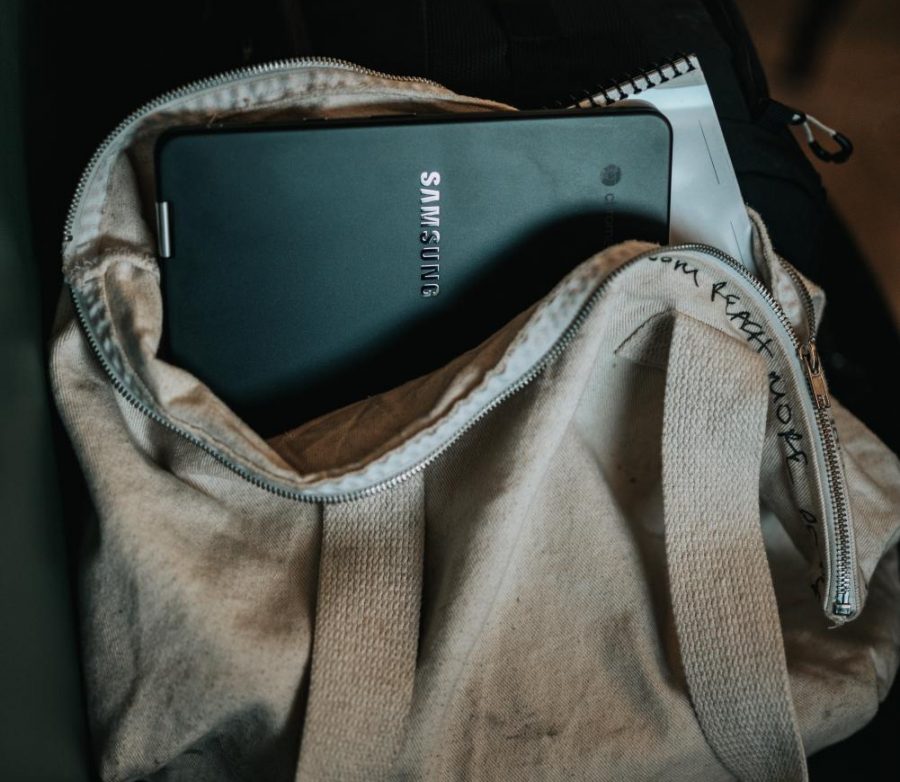LOHS to roll out one-to-one Chromebook policy next school year
April 13, 2020
Next school year, both of the LOSD high schools aim to adopt a one-to-one computing policy; the plan is for each LOHS and LHS student to “check out” their own Chromebook to use for the duration of the school year. This proposal follows suit with the district’s middle schools, which both implemented the one-to-one policy two years ago.
According to LOHS Principal Rollin Dickinson, “The idea for next year would be that at registration while the students are checking out textbooks, they would also be able to check out a Chromebook that they could just have for the whole year, rather than our current model, which is primarily class-by-class.”
Dickinson explained that, through bond funding, the school finally has enough money to buy a number of Chromebooks that is sufficient for a true one-to-one system.
“The primary reason for the decision is about having equitable access to a helpful tool for students,” Dickinson said, “but, talking to some parents, they’re excited that they don’t have to buy Chromebooks for their kids, so in that sense it also saves money by not having a redundancy of purchases of the same tool.”
While emphasizing the benefits of the new model, Dickinson also admitted that it could bring about some new obstacles as well. “We have some work to do to figure out exactly what sort of technology use agreements we set up, and whether or not to have an insurance plan for the Chromebooks, and what you do if you’re a student and you left your Chromebook at home… Fortunately, both middle schools have moved to a model where they do check them out already… so we can learn from them.”
LOJ Principal Kevin Mills stated that, although there have been challenges, the middle school’s implementation has better allowed teachers to integrate technology into their lessons.
In response to the Covid-19 outbreak, LOSD has shifted from in-person to online learning in order to comply with social distancing mandates; to that extent, Mills said, “it has been quite valuable having computers already checked out to our students.”
The majority of LOHS students and teachers have little idea of what to expect from a one-to-one policy; the class of 2023, however, has already experienced one-to-one (it was implemented when they were eighth graders at LOJ).
Freshman Class President Alex Aghdaei recalled his experience with one-to-one computing at LOJ as mixed. On the one hand, he said, “it provides opportunity to people who wouldn’t otherwise be able to have access to computers, and it promotes student responsibility because it forces students to remember to bring their things every day.”
However, Aghdaei also indicated potential issues with the model. “First, the issue with providing every student with a Chromebook is that some students already have computers… What happened a lot of times is I wouldn’t really want to use a Chromebook because all my files were saved on my computer, but some teachers would enforce a rule that you had to use the Chromebooks that the school provided you. Second, if someone had a mechanical issue with their Chromebook at LOJ, then they couldn’t get access to a computer at school whatsoever, versus with a cart, where you can get a new computer if you’re experiencing technical difficulties.”
Aghdaei concluded by offering one possible solution. “I think [each model] needs to be adjusted to meet the needs of the students at the school. For example, Lincoln High School has asked all its students to buy a computer or Chromebook, and if they can’t afford one, they’ll buy them a Chromebook to keep. This enhances the actual usability: the people that need the Chromebooks can still get them, but you’re also not giving Chromebooks to people who don’t need them, and you get to retain a set of Chromebooks within the school.”
Lake Views conducted a poll of more than 75 LOHS students in order to gauge student opinions towards a possible one-to-one policy. (To view the full polling data, click here.) While 78.9 percent supported the idea of the school checking out a Chromebook to every student at the start of each year, 84.2 percent said that they would not support the policy if it meant that they would not be allowed to use their personal computers at school.
The poll also revealed that, in many students’ experiences, Chromebooks can be quite prone to the technical issues that Aghdaei alluded to; only 11.8 percent of students said that they “very rarely” or “never” experienced technical difficulties with Chromebooks. 28.9 percent said they “sometimes” experienced Chromebook issues, 31.6 percent said they experienced issues “pretty often” and 27.6 percent said they experienced issues “all the time.”
Furthermore, Dickinson said that at LOJ “they have had more cases of students damaging them accidentally than we have [at LOHS].”
Despite these issues, Mills maintained that one-to-one has been an overall positive for LOJ students, and said that he preferred the one-to-one model to any other system that has been tried in the past.


